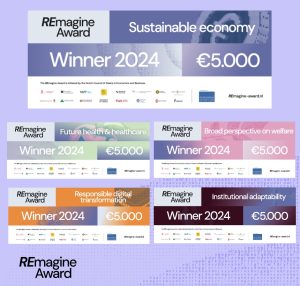Selection Procedure REmagine Award 2025
Overview of the DEB REmagine Thesis Award 2025 Selection Procedure
The second edition of the DEB REmagine Award embodies a vision of economic transformation that places human wellbeing at its center. Through a carefully orchestrated two-stage selection process, the award seeks to recognize master’s thesis research that reimagines our economic systems across five interconnected transition themes, culminating in a celebration of academic excellence on December 2, 2025, during the DEB Impact Forum.

The Journey Begins at Faculty Level
The selection process starts at the grassroots level within each participating faculty of economics and business, where education deans—or education directors in faculties without deans—orchestrate a search for research that challenges conventional economic thinking. They work closely with program directors and academic directors who conduct the initial screening within their respective master’s programs, looking for work that demonstrates not just academic rigor but also a commitment to human-centered economic solutions.
Each faculty of economics and business has the autonomy to organize its internal selection process, often involving core lecturers and thesis supervisors who can provide valuable insights into how student work addresses the dimensions of a decent economy.
The pre-selection criteria reflect this dual focus: theses must achieve a grade of 8 or higher while demonstrating social relevance that resonates with a broad audience. This emphasis on accessibility ensures that selected research can contribute meaningfully to public discourse on creating more inclusive and sustainable economic systems.
Balancing Themes for Comprehensive Impact
By October 1, 2025, each faculty of economics and business must submit its carefully curated selection, ensuring balanced representation across the five DEB transition themes, including the focus on the transition towards a more human-centered economy:
- Sustainable economy – reimagining economic models that respect planetary boundaries
- Broad perspective on prosperity – moving beyond GDP to measure what truly matters for human flourishing
- Digital transformation – harnessing technology for inclusive progress
- Healthy society – placing wellbeing at the heart of economic policy
- Changing institutions – reforming structures to serve people and planet
The faculties of economics and business differ in the number of degrees and graduates they produce. This is why we have established submission quotas. Faculties are invited to nominate a maximum of two theses for the education programme with over 100 students, one for smaller faculties. This is to ensure diversity while maintaining quality. Crucially, faculties of economics and business must submit at least one thesis per theme when possible, guaranteeing that all dimensions of economic transformation receive attention. This thematic balance reflects the interconnected nature of the challenges we face and the need for holistic solutions.
From Faculty Selection to National Competition
The transition from faculty-level selection to national competition marks a significant shift in the evaluation process. Between October and November, an independent jury examines the submissions by the faculties. Each theme is evaluated by a unique pairing of experts, representing both practice and academia, ensuring that theoretical insights are balanced with real-world applicability.
These expert teams, including leaders from organizations like Rabobank, Google, MENZIS, and the Sustainable Finance Lab, alongside distinguished academics from economics and business faculties, apply five comprehensive criteria that capture the essence of transformative research:
- Relevance forms the foundation, as jury members assess the innovativeness of research questions and their connection to emerging trends within each transition theme. They look for students who demonstrate genuine commitment and can articulate their research’s social relevance in accessible language.
- Quality weighs the methodological rigor, with particular emphasis on primary data collection (counting for 40% of this criterion). The jury seeks originality in approach and robustness in analysis that advances academic understanding.
- Applicability ensures that theoretical insights translate into practice, examining how research findings can inform economic policy, business strategy, and other societal stakeholders relevant to each transition theme.
- Potential for value creation evaluates the transformative power of the research, focusing on clear, implementable recommendations that can drive positive social change. The quality of these recommendations carries significant weight (40% of this criterion), reflecting the award’s commitment to actionable research.
- Integration of Human-Centrered Economy dimensions serves as the overarching criterion, assessing how well the research embodies the principles of a Human-Centred economy and develops insights that can reshape economic thinking and practice.
The Final Stage: Celebrating Transformative Research
The jury’s deliberations result in 3-5 nominees per theme, creating a balanced representation of 15 finalists who embody the promise for future of economic thinking. These finalists represent diverse approaches to reimagining our economic systems, from sustainable finance innovations to digital inclusion strategies, from wellbeing measurement frameworks to institutional reforms.
On December 2, 2025, at the Annual DEB Impact Forum, these academic journeys converge. Finalist
s present their research to the jury chaired by Herman Mulder, demonstrating not just academic excelle

nce but also genuine commitment to economic transformation that serves humanity. The jury selects one winner per theme, ensuring that all five dimensions of the transition are equally celebrated.
The winners of the REmagine award receive this:
- A specially designed crystal statue with the name of the award and the title of the impact theme.
- A monetary award of 5000 Euro
Throughout this entire process, the REmagine Thesis Award maintains its core mission: identifying research that transcends traditional economic thinking to offer practical pathways toward an economy that truly serves people and planet. The equal emphasis on all five
themes ensures that winners collectively represent a comprehensive vision for economic transformation—one that recognizes that sustainable prosperity, digital progress, societal health, and institutional reform must advance together to create the decent economy of the future.